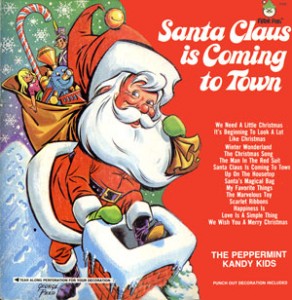 The latest in what promises to be many courtroom disputes over termination rights came, appropriately, just before many of us sat down to enjoy lavish Christmas dinners. The estate of a co-writer of the holiday classic “Santa Clause is Coming to Town” has filed a lawsuit against EMI seeking a declaration that will determine the validity of a termination notice that was sent to the music publisher.
The latest in what promises to be many courtroom disputes over termination rights came, appropriately, just before many of us sat down to enjoy lavish Christmas dinners. The estate of a co-writer of the holiday classic “Santa Clause is Coming to Town” has filed a lawsuit against EMI seeking a declaration that will determine the validity of a termination notice that was sent to the music publisher.
Termination rights is a complicated subject that no doubt will incite many court cases in the coming years as new precedents are set in relation to a provision of the current version of United States copyright law, which went into effect in 1978. The debated provision in that act states that artists are allowed to terminate copyright grants 35 years after the song is first published. If those copyright grants are terminated, then the copyrights of the song would revert back to the original songwriter. Since the 35 years will be up in 2013, and artists have a two-year window prior to that to file a claim, the rights to many songs currently are being debated.
“Santa Claus is Coming to Town” adds a slightly new twist to the termination rights concerns because of a long and unique history, in part because it was written and published before 1978 when the new terms took place. J. Fred Coots, on whose behalf the lawsuit is being filed, co-wrote the song in 1934 with Haven Gillespie. Publishing rights to the song originally were assigned to Leo Feist, at the time the owner of one of the largest publishing companies in the world. That contract was renewed several times, including in 1981, three years after the 1978 copyright act went into effect. That same year, Coots came to an agreement with the company after sending a termination notice to the publishing company that owned the rights after acquiring Feist’s company. Coots died in 1985, and the publishing company was eventually owned by EMI.
The debate was sparked again in 2006 when Coots’ estate sent yet another termination notice to EMI after reaching a publishing agreement with Warner Bros. Music Corporation. EMI contested the notice, saying that Coots already had exercised his termination rights in 1981, while the estate says that notice was invalid. The case currently is in a Florida federal court.
The amount of money to be made from owning the copyright for one of the most popular Christmas songs of all-time is extremely high. The song has been covered by over 150 musicians, including Bruce Springsteen, Green Day, Lynyrd Skynyrd and recently on a Christmas album by Justin Beiber.
While many of the new termination rights cases will focus on songs published during or after 1978, the law still leaves much up for interpretation for songs published before this time. This particular case raises common questions that must be settled in court, such as how rights are handled when the song is co-written, as well as what constitutes a “valid” termination rights notice.

